Currently Empty: ₦0.00
Business In Nigeria
How To Register And Get SMEDAN Certificate Free! [Step By Step In 2025]

Introduction To SMEDAN Certificate
How do I get SMEDAN Certificate for my business?
This is a common question asked by many business owners in Nigeria who desire to access business opportunities easily.
We will answer you in details here!
The Small and Medium Enterprises Development Agency of Nigeria (SMEDAN) is a government-backed organization dedicated to empowering Micro, Small, and Medium Enterprises (MSMEs) in Nigeria.
Since its founding, SMEDAN has played an essential role in helping local businesses thrive by offering support, training, and resources tailored to the needs of Nigerian entrepreneurs.
One of SMEDAN’s most valuable resources is the SMEDAN Certificate — a free document that verifies a business’s status as an MSME in Nigeria.
Not only does this certificate add credibility to your business, but it also opens the door to numerous benefits, from grant eligibility to networking opportunities with industry leaders.
Obtaining a SMEDAN Certificate gives you access to government resources specifically designed to aid MSME growth.
Whether you’re seeking to establish business credibility or gain exposure to potential investors, this Smedan registration certificate can be a game-changer.
Did you know?
According to the National Bureau of Statistics (NBS) and the Small and Medium Enterprises Development Agency of Nigeria (SMEDAN), there were 41,543,028 MSMEs in Nigeria as of December 2017, and those with a SMEDAN Certificate often find it easier to qualify for grants, support programs, and networking events than those without it.
In this blog post on Greenlearners Technologies, we will explore exactly what this SMEDAN Certificate entails and how you can obtain yours free in less than 10 minutes.
What is the function of Small and Medium Enterprises Development Agency of Nigeria?

The Small and Medium Enterprises Development Agency of Nigeria (SMEDAN) was set up to boost the growth of small businesses across the country, and it officially came into being in 2003 with the passing of the SMEDAN Act.
SMEDAN has a clear mission:
- To stimulate, monitor, and coordinate the development of micro, small, and medium-sized enterprises (MSMEs)
- To create and implement policies that encourage the growth of MSMEs
- To engage in capacity building
- To help MSMEs access credit and other forms of funding
A thriving MSME sector is viewed as a crucial way to combat poverty and drive Nigeria’s prosperity. In its role as the champion for small businesses, SMEDAN plays a vital part in the Nigerian economy.
SMEDAN operates through its headquarters in Abuja and several offices across the country to support the development of small businesses.
Additionally, it works closely with various partner institutions like the Bank of Agriculture (BOA) and the Bank of Industry (BOI) to further enhance its efforts.
Distribution of Registered MSMEs In Nigeria by Industry
Here’s a pie chart developed by Greenlearners Technologies to show you the distribution of registered MSMEs In Nigeria by industry.
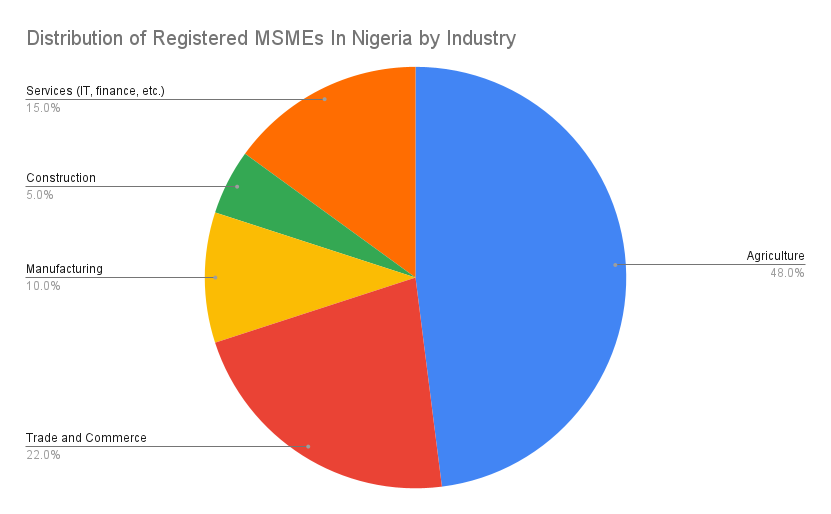
What is the SMEDAN Certificate?
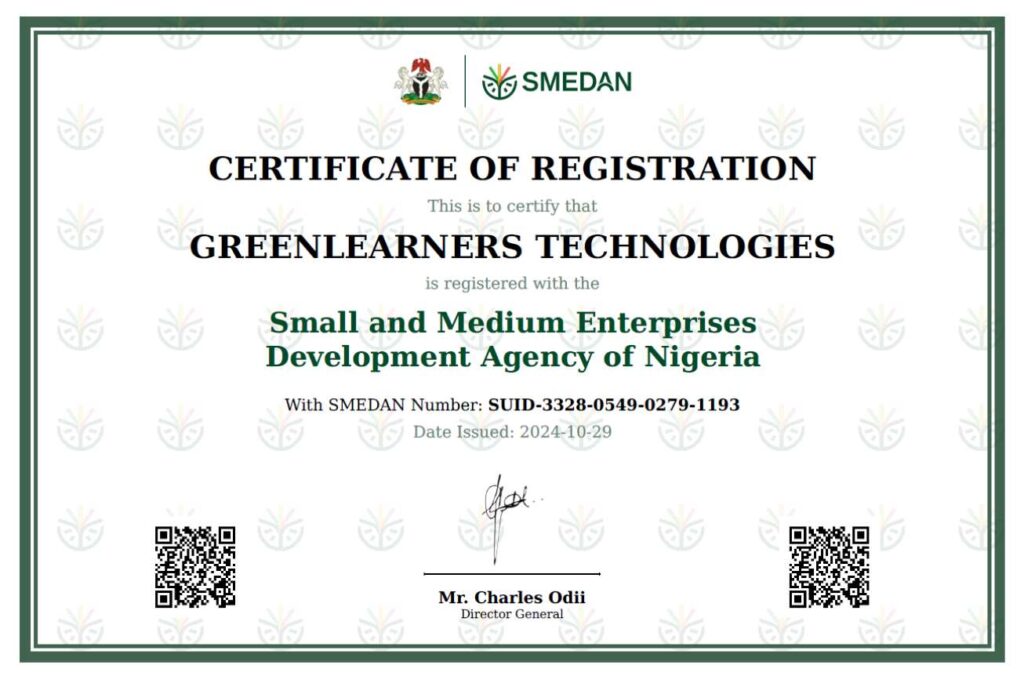
The SMEDAN Certificate is an official document provided by SMEDAN to recognize and verify a business as a part of Nigeria’s MSME sector.
This certification represents more than just a piece of paper—it is proof that a business operates within the standards set for MSMEs in Nigeria, making it eligible for exclusive benefits.
Having a Smedan registration certificate distinguishes your business as one committed to contributing to Nigeria’s economy while also giving you a level of trustworthiness among customers and stakeholders.
Key benefits of the SMEDAN Certificate include enhanced credibility, increased access to grants, and eligibility for government and private-sector resources.
With many Nigerian MSMEs reported to have benefitted from SMEDAN resources as of 2024, acquiring this SMEDAN Certificate can help you tap into exclusive funding opportunities, specialized training, and tools that can accelerate your business growth.
Moreover, the Smedan registration certificate allows businesses to connect with a network of industry experts and peers for collaborative growth.
Table Showing Some Of The SMEDAN Certificate Benefits
| Benefit | Description |
|---|---|
| Credibility | Increases business reliability and trust among clients. |
| Access to Funding | Eligible for various grants and loans. |
| Networking Opportunities | Connects MSMEs with experts and industry leaders. |
| Government Support Programs | Access to resources and support initiatives by the government. |
Why Get A SMEDAN Certificate?

Here are some reasons why you need to get a SMEDAN certificate in Nigeria:
1. Mentorship
SMEDAN has mentorship programs initiated for personal and professional development.
Such initiative increases skill development and successful small business owners who are better equipped to deal with challenges arising from entrepreneurship.
2. Access to Infrastructure and Facilities
The association has secured access to facilities owned by SMEDAN, most of which come at very concessionary rates, as is the case with the SMEDAN Garment and Textile Hub.
Such access opens up avenues whereby the budding entrepreneurs will have at their disposal facilities that will definitely help to drastically reduce the cost of operations.
3. Access to Government Initiatives
Usually, SMEDAN is involved in many initiatives and programs driven by the government to assist SMEs in all ways possible.
Such liaisons may result in financial support, training, and other things that are necessary for growth.
4. Entrepreneurship Awareness
Inclusion in SMEDAN evokes the creation of awareness in entrepreneurship and at large in the economic development of Nigeria.
The implication of this is the making of the economy lively and active, the consequence of which is enjoyed by all in society.
5. Networking and Collaboration
Membership in the SMEDAN affords you the opportunity to network with fellow entrepreneurs, other business associations, and government agencies.
Such networking promotes partnerships and collaboration that may benefit your business through resource and knowledge sharing.
6. Support on Legal and Regulatory Issues
SMEDAN assists SMEs in understanding the legal and regulatory demands of the business, thereby helping them to respond to those demands.
Among them are statutory business requirements from institutions like the Corporate Affairs Commission.
This support is very crucial to new businesses that may be thinking about their legal responsibilities.
7. Research and Information
SMEDAN undertakes research into SME development; such research would provide insights and data to inform business strategies.
Without information on market trends, one cannot make strategic decisions.
8. Market Linkages
It assists SMEs in accessing markets by identifying procurement opportunities, trade fairs, and exhibitions.
This could translate into more sales and therefore visibility in the market.
9. Policy Advocacy
The agency advocates for policies that guarantee an enabling environment for SME development, thereby ensuring that your interest is taken care of at the governmental level.
Its advocacy function is very important in bringing an enabling environment for small enterprises.
10. Business Support Services
SMEDAN provides service offerings in the development and promotion of SMEs by building capacity through business development training and access to market information.
These are designed in such a way as to ensure that entrepreneurs have at their disposal the needed tools to enable them to succeed.
11. Access to Finance
SMEDAN links SMEs with sources of finance, such as banks, microfinance institutions, and venture capitalists.
The link is very critical because this would afford business enterprises opportunities that give them access to capital for expansion.
12. Skill Development
You will have the opportunity to take part in training programs under SMEDAN in order to enhance your entrepreneurial skills and the general competitiveness level in your business.
Continuous learning is a core requirement in today’s fast-moving market.
As you can see, if you decide to join the Small and Medium Enterprises Development Agency of Nigeria (SMEDAN), it can be one of the smartest moves for any budding entrepreneur or small business owner aiming to grow and succeed in Nigeria’s competitive business environment.
SMEDAN offers key advantages under its G.R.O.W framework, which means;
- Guidance
- Resources
- Opportunities, and
- Workforce support.
These help to foster business resilience in Nigeria.
Through SMEDAN, you can get access to exclusive mentorship programs designed to boost both personal and business growth or access to specialized SMEDAN facilities, like the Garment and Textile Hub, at discounted rates.
More than just infrastructure, SMEDAN connects entrepreneurs with essential government initiatives, creating a pathway to funding, training, and business development opportunities.
For Nigerian business owners, getting a SMEDAN Certificate can enhance credibility, simplify regulatory compliance, and provide unmatched resources to navigate legal frameworks and market linkages that elevate their business potential.
Eligibility Criteria for SMEDAN Registration
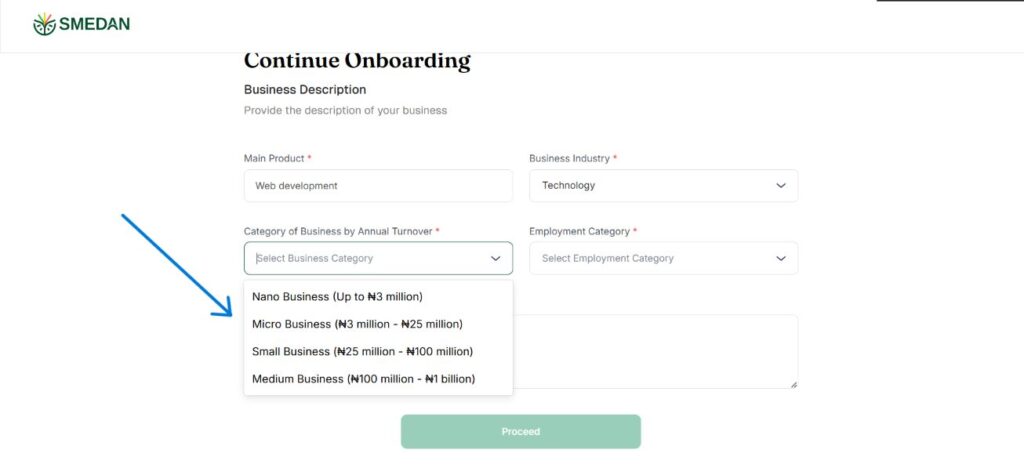
Before obtaining a SMEDAN Certificate, your business must meet certain eligibility criteria.
First, your business needs to be categorized as an MSME, which encompasses micro, small, and medium-sized enterprises in Nigeria.
To be classified as an MSME, a business typically has fewer than 200 employees and operates within Nigeria.
Also, businesses are required to be legally registered with the Corporate Affairs Commission (CAC) and must be able to provide verifiable identity documents.
- Nano Business: Up to ₦3 million in assets with 1 to 2 employees
- Micro Business: 3 to 9 employees or ₦3 million – ₦25 million in assets.
- Small Business: 10-49 employees or between ₦25 million and ₦100 million in assets.
- Medium Business: 50-199 employees or between ₦100 million and ₦1 billion in assets.
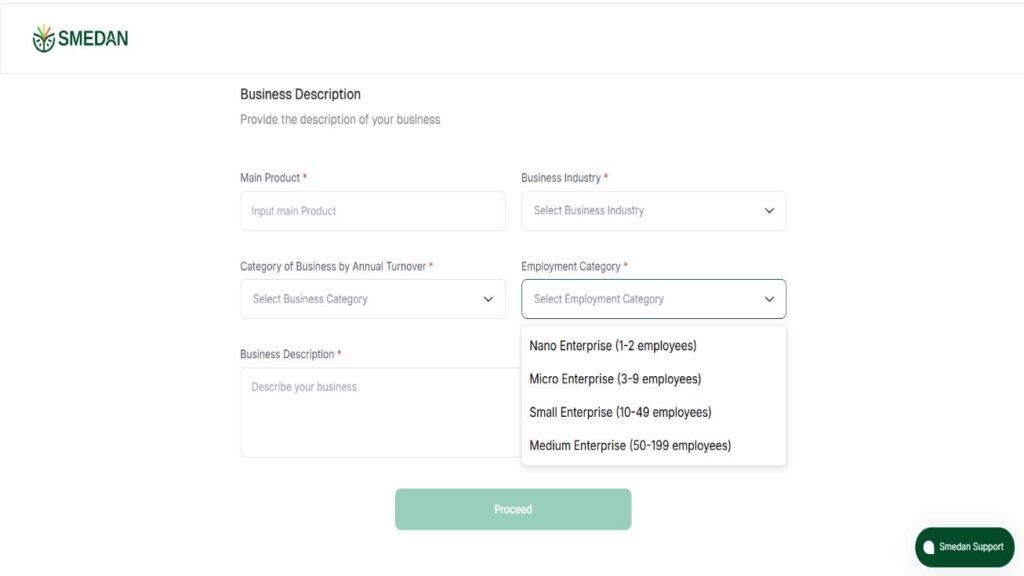
To successfully obtain a Smedan registration certificate, you’ll need to provide accurate and verifiable details such as your business name, contact information, and a valid form of identification.
Meeting these criteria not only validates your business as eligible for SMEDAN registration but also ensures that you can reap the full range of benefits the SMEDAN Certificate offers.
How to Register for a SMEDAN Certificate
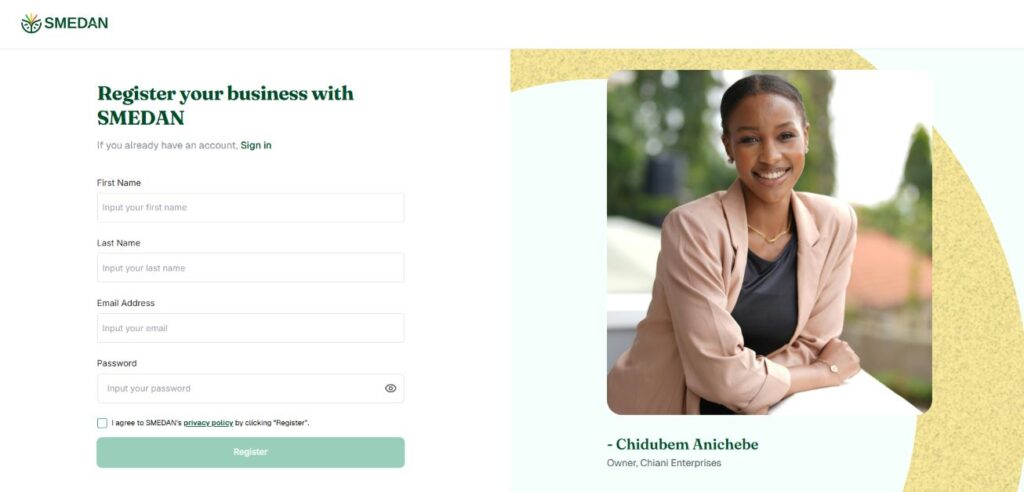
Ready to register? Here’s a simple, step-by-step guide to obtaining your SMEDAN Certificate free of charge:
- Visit the SMEDAN Registration Website: Head over to https://smedan.gov.ng to access the official SMEDAN registration platform.
- Complete the Registration Form: Provide your details accurately, including your business name, phone number, email address, and CAC registration number.
- Verify and Submit: Once all the necessary information is filled out, submit your application. Double-check all details to avoid common errors.
- Await Confirmation: Check your email for a confirmation message, which will provide further instructions on accessing your Smedan registration certificate.
Each step is essential to ensuring your application is processed smoothly.
The SMEDAN Certificate is free, so take advantage of this opportunity to elevate your business and position yourself better for more opportunities.
Just think of the added credibility your business gains once you have a Smedan registration certificate to back it up.
Accessing Your SMEDAN Certificate
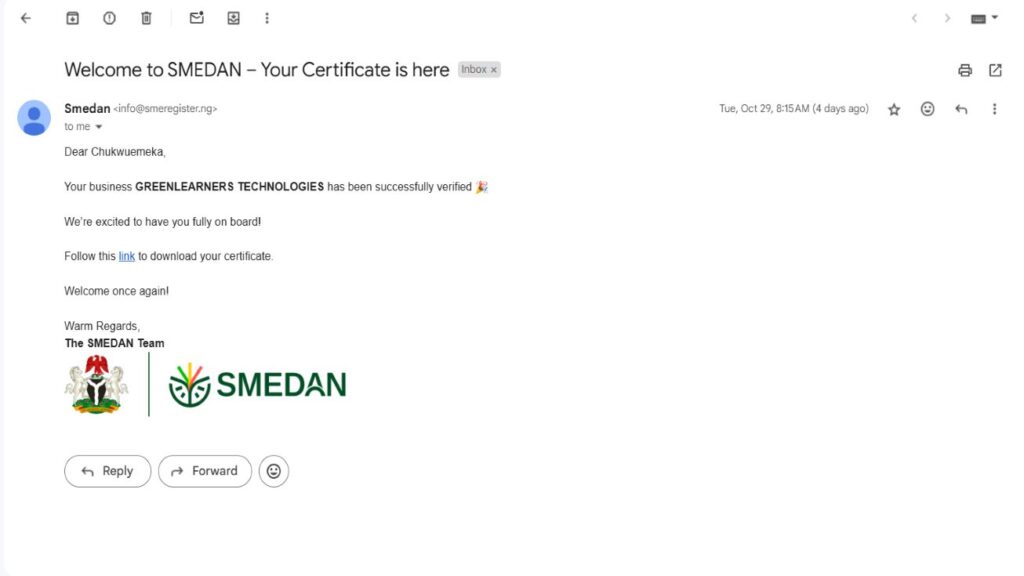
After successful registration, downloading your SMEDAN Certificate is straightforward.
You can download it directly from the portal once you’ve received an email confirmation.
SMEDAN Certificate Download
- Email Notification: Once your application is processed, SMEDAN will send an email confirmation containing a link to download your certificate like the one above.
- Log into the Portal: Visit the SMEDAN portal, log in using the credentials created during registration, and navigate to the “My Business” section.
- Download Your Certificate: Click on the “Download SMEDAN Cert” option to obtain a digital copy of your SMEDAN Certificate.
SMEDAN Certificate PDF
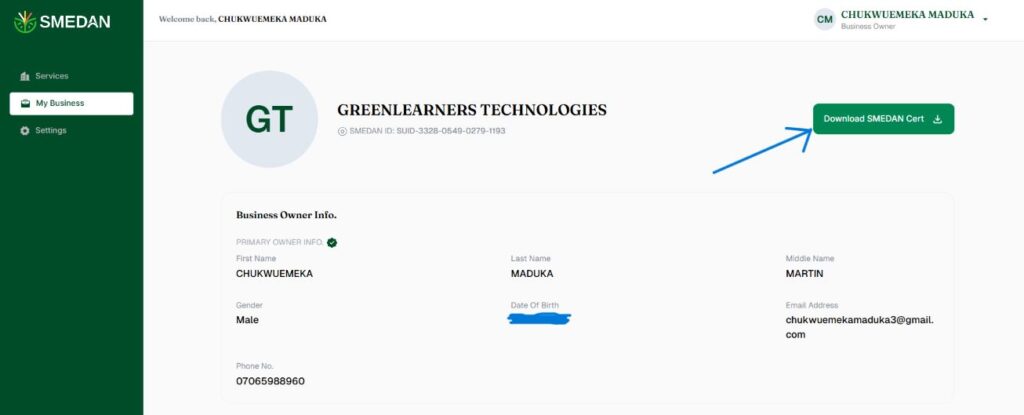
For those who prefer a hard copy or need to save it as a PDF:
- Save as PDF: Simply download the Smedan registration certificate from the portal, and select the “Save as PDF” option available in most browsers. This makes it easy to print a physical copy whenever you need it.
Downloading your SMEDAN Certificate allows you to keep a digital or hard copy on hand, which can be valuable when applying for business grants or loans.
Navigating the SMEDAN Certificate Portal
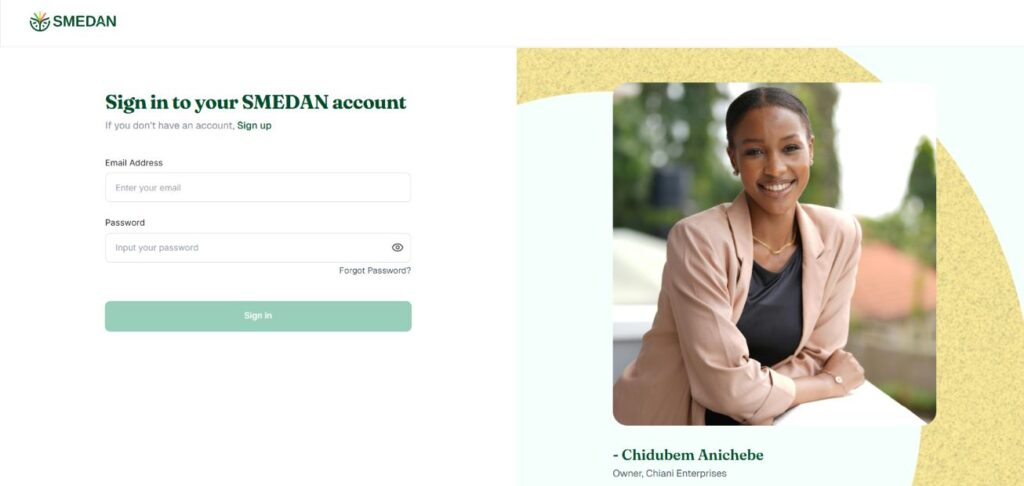
The SMEDAN Certificate Portal is a user-friendly platform that allows you to manage your SMEDAN Certificate, check your application status, and update your details.
Here’s how you can navigate the portal effectively:
SMEDAN Certificate Portal Login
- Login Credentials: Use the email and password you created during registration to access your account.
- Security Tip: Ensure your credentials are secure, and consider setting a strong password to protect your account from unauthorized access.
SMEDAN Certificate Portal Registration Online
When registering online, here are a few tips to ensure a smooth experience:
- Provide Accurate Details: Make sure that all information you input is accurate and up-to-date.
- Avoid Common Errors: Double-check your CAC registration number and ensure your email is correctly typed, as these details are essential to your Smedan registration certificate processing.
How To Manage Your SMEDAN Account
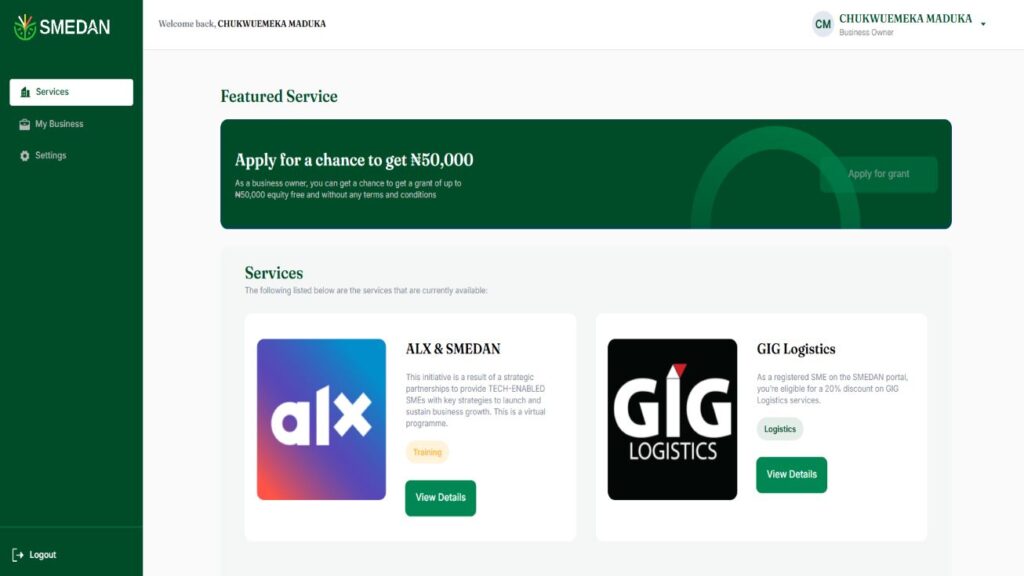
Once you have your SMEDAN Certificate, you can manage it through the SMEDAN portal.
This includes checking the status of your Smedan registration certificate, updating your profile information, and more.
How to Check My SMEDAN Certificate
To verify the status of your SMEDAN Certificate, log in to your SMEDAN account, navigate to the “My Business” section, and view your registration status.
To verify the status of your SMEDAN Certificate, follow the instructions below.
- Download Your Certificate: If needed, you can download your SMEDAN registration certificate directly from this section after verifying your status. The certificate is usually sent to your registered email upon successful registration, but it can also be accessed through your account dashboard
- Log in to Your SMEDAN Account: You should start by logging into your SMEDAN account using your registered email or phone number and password.
- Navigate to the “My Business” Section: Once logged in, you should look for the “My Business” section. This is typically where you can view your registration status and other related information.
- View Registration Status: In this section, you will be able to see your registration status, which confirms whether your SMEDAN Certificate is active or if there are any issues.
Common Issues and Solutions
While the registration process is generally smooth, here are some common issues that users may encounter and how to solve them:
- Portal Access Issues: If the portal isn’t loading, ensure your internet connection is stable or try accessing it from a different browser.
- Confirmation Email Not Received: Double-check your spam or junk folder, as emails from SMEDAN may sometimes be filtered.
- Password Reset: If you forget your password, simply use the “Forgot Password” feature on the portal to reset it.
Here are some common challenges you might face during registration or login:
| Issue | Solution |
|---|---|
| Portal Access Issues | Ensure stable internet; clear browser cache if needed |
| No Confirmation Email | Check spam/junk folders; resend confirmation request |
| Download Problems | Ensure correct login details; try different browsers |
By following these tips, you can troubleshoot minor issues and streamline your registration experience for a SMEDAN Certificate.
Funding and Types of Loans Available through SMEDAN
When it comes to funding, SMEDAN doesn’t directly give loans to businesses.
Instead, think of them as a middleman that connects eligible micro, small, and medium enterprises (MSMEs) with suitable loan providers.
SMEDAN often partners with other government agencies, like the Bank of Industry (BOI) and the Central Bank of Nigeria (CBN), to facilitate credit access for small businesses.
While SMEDAN focuses mainly on entrepreneurship training and business development, the actual loan disbursement is managed by these other institutions.
In addition to public sector loans, SMEDAN can also help small businesses tap into private sector credit options, including commercial banks, finance houses, and microfinance banks.
Qualifying for a SMEDAN Loan
Pretty much all MSMEs can qualify for a loan through one of SMEDAN’s initiatives.
The primary requirement is that you have a registered business, but even unregistered businesses can apply and register later on.
If you’re looking to get a loan from a commercial bank, being registered is essential, and the bank will have its own lending criteria.
SMEDAN can help guide you through the main lending requirements most commercial banks have.
How to Apply for a SMEDAN Loan
You can apply for a loan through SMEDAN in two ways: by joining one of their training programs or by using their credit information portal before applying for a loan from a commercial bank.
Applying through SMEDAN
To get a loan, consider applying to one of SMEDAN’s sponsored initiatives, which usually involve training on various business aspects.
You can start by visiting a SMEDAN office near you to fill out an application form, and you might be invited to attend a course or training program.
There’s also a new MSME registration portal where you can register online.
After successfully completing a course, you might receive a conditional grant to help start or expand your business or even a soft loan with lower interest rates and often no collateral required.
Regardless of whether you receive a grant or a loan, you typically need to have a registered business or be encouraged to register as part of the program.
The Corporate Affairs Commission (CAC) handles business registrations in Nigeria.
Depending on your business type, you might also need to register with the Standards Organization of Nigeria (SON) and the National Agency for Food and Drug Administration and Control (NAFDAC).
Additionally, you’ll need to prepare a business plan that outlines how you’ll use the funds.
Using SMEDAN’s Credit Information Portal
SMEDAN has a Credit Information Portal that can be a great resource for those looking to apply for a commercial bank loan.
This portal serves as a database of credit facilities available to MSMEs in Nigeria.
On the portal, you’ll find key details about lenders, how much you can borrow, loan repayment periods, and interest rates.
Besides business loans, there are options for personal loans, mortgage loans, and credit cards.
The portal includes a search function that matches you with appropriate lenders based on the information you provide.
However, you can’t apply for a loan directly through the portal; instead, you’ll need to reach out to the financial institution yourself.
Think of the SMEDAN credit portal as a valuable resource for credit information rather than a direct loan application tool.
Loan Application Checklist
Here’s a quick checklist of what you might need before getting a loan through SMEDAN or a commercial bank:
- Completed application form
- Business plan
- Cash flow budget
- Certificate of Incorporation
- Valid means of identification (like a driving license, passport, or voter’s card)
- Proof of address
- Details of collateral offered (if applicable)
Conclusion
The SMEDAN Certificate is a valuable asset for any MSME in Nigeria looking to gain credibility and access exclusive resources.
With this Smedan registration certificate, your business can unlock numerous opportunities, from financial aid to industry networking.
By registering for a SMEDAN Certificate, you’re not only enhancing your business’s credibility but also gaining a solid foundation for growth.
Have you registered for your SMEDAN Certificate yet?
Share your experience or any challenges you encountered in the comments.
For questions about the Smedan registration certificate process, feel free to ask, and we’ll help you through it!
FAQs
1. What is the difference between CAC and SMEDAN registration?
CAC (Corporate Affairs Commission) registration is a legal requirement for all businesses in Nigeria, ensuring they are recognized as legal entities. In contrast, SMEDAN registration focuses on supporting micro, small, and medium enterprises (MSMEs) through resources, funding access, and training.
2. What is a SMEDAN certificate used for?
A SMEDAN certificate is used to validate your business’s registration with SMEDAN, enhancing credibility and access to funding opportunities, government support programs, and specialized training.
3. How to download SMEDAN certificate?
To download your SMEDAN certificate, log into the SMEDAN portal using your registered email and password. Navigate to your dashboard where you can view and download your certificate.
4. What is the benefit of SMEDAN?
The benefits of SMEDAN include access to funding, enhanced business credibility, networking opportunities, specialized training programs, and government support initiatives tailored for MSMEs.
5. Can I use a SMEDAN certificate in a bank?
Yes, banks often recognize the SMEDAN certificate as proof of legitimacy and may consider it when assessing loan applications or opening business accounts.
6. How can I get a business certificate in Nigeria?
To obtain a business certificate in Nigeria, you must first register your business with the CAC and then apply for a SMEDAN registration certificate to access additional benefits.
7. Can I register my business with SMEDAN?
Yes, you can register your business with SMEDAN if it qualifies as a micro, small, or medium enterprise under their classification criteria.
8. Is SMEDAN a loan?
No, SMEDAN itself does not provide loans directly; instead, it facilitates access to loans from other financial institutions and government agencies.
9. What is the full meaning of SMEDAN?
The full meaning of SMEDAN is the Small and Medium Enterprises Development Agency of Nigeria.
10. What are the requirements for SMEDAN?
Requirements for registering with SMEDAN include being legally registered with CAC, operating within Nigeria, having a verifiable identity document, and meeting specific MSME criteria.
11. Is SMEDAN giving grants?
Yes, SMEDAN offers conditional grants as part of specific initiatives aimed at supporting MSMEs.
12. Who is the CEO of SMEDAN?
As of now, the CEO of SMEDAN is Mr. Olawale Fasanya; however, this information may change over time.
13. How can I retrieve my SMEDAN number?
You can retrieve your SMEDAN number by logging into your account on the SMEDAN portal or contacting their customer service for assistance.
14. Can I open a business account with SMEDAN?
While you cannot open a bank account directly with SMEDAN, having a SMEDAN certificate can facilitate the process of opening a business account with financial institutions.
15. What is the interest rate for the SMEDAN loan?
The interest rates associated with loans facilitated by SMEDAN vary depending on the program but are generally low or even zero for certain initiatives.
16. Does SMEDAN ask for BVN?
Yes, during registration or loan application processes, SMEDAN may require your Bank Verification Number (BVN) as part of identity verification.
17. What is SMEDAN business name?
The term “SMEDAN business name” typically refers to businesses registered under the Small and Medium Enterprises Development Agency of Nigeria framework that have obtained their SMEDAN certificate.
18. Is SMEDAN different from CAC?
Yes, while both organizations serve essential roles in business development in Nigeria, CAC focuses on legal registration while SMEDAN provides support services for MSMEs.
19. What is the use of a SMEDAN certificate?
The use of a SMEDAN certificate includes validating your business’s legitimacy and providing access to various government programs and funding opportunities tailored for small businesses.
20. Which is the best bank for small business in Nigeria?
While opinions vary based on individual needs, banks like Access Bank, First Bank of Nigeria, and Guaranty Trust Bank are often recommended for their tailored products and services aimed at small businesses.


